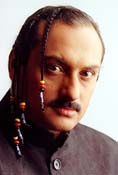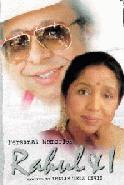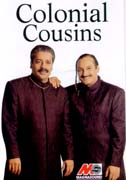Sharmila Taliculam
 Piya Tu, Ab Tho Aaja is a song that, for the connoisseur
of popular Hindi film music, is immediately memorable not merely
for Helen's standout dance, but also for R D Burman's catchy composition
and Asha Bhonsle's immaculate rendition.
Piya Tu, Ab Tho Aaja is a song that, for the connoisseur
of popular Hindi film music, is immediately memorable not merely
for Helen's standout dance, but also for R D Burman's catchy composition
and Asha Bhonsle's immaculate rendition.
The song is typical of RDB's genius, in that he used the emerging
Western musical idiom to brilliant effect in the context of the
Hindi film tunes. And RDB, ever one to remain contemporary, was
even then aware that the current and the dated are merely two
sides of the same coin - thus, his insistence that his old songs
should be redone.
This is what his wife, Asha Bhonsle, has attempted with her album
Rahul And I - and the person she choose to reprise the
genius of her late husband is none other than Leslie 'Lezz' Lewis.
Leslie, son of the renowned dance director P L Raj, was for his
part never interested in composing for the film industry - his
big trip was Western music. And he stuck to this decision despite
much urging from his father, who was dreaming dreams of choreographing
dances to his own son's compositions. "The more he forced
me to compose for Hindi films, the more I didn't want to do it,"
recalls Leslie.
He was, however, much influenced by the Indian classical music
that his father loved listening to, besides his own favourite
pop and rock stars ranging from the Beatles to Jimi Hendrix.
Without his father's backing, Leslie started out playing his own
music in the nightclub of the Oberoi Hotel, and in Café
Royale - a fact he withheld from his father, because in those
days musicians were supposed to be a wild bunch and he didn't
want to alarm his father unduly. "He didn't like the idea
of the 'wine women and song' lifestyle - wine and women were a
definite no-no, and song was okay provided they were Hindi songs,"
Leslie smiles.
He then took it into his head to learn guitar, from the Guitar
University of Technology in Boston - another dream his father
promptly nixed. Today, though, Leslie is grateful - he feels that
his playing of the instrument does not have the rigidity that
is the hallmark of students who have trained at that centre.
Leslie continued his musical education, thus, while assisting
jazz doyen Louis Banks, with the latter composing the music and
Leslie giving it the final touches. Having got the experience
he required, Leslie then went independent, and composed for pop
albums ranging from Sunita Rao's Pari Hoon Main and Alisha
Chinai's De De De Mujko. Besides, he also did ad jingles
ranging from Vimal, Thumbs Up, and Mango Frooti to the Voltas
Laundrette ad, which won the best campaign award in the recent
Ad Club awards jamboree.
"Sure, I will even do Hindi film music, but only on my terms,"
says Leslie. "If these people want the Laxmikant Pyarelal
or R D Burman kind of music, then let them go to others - I will
compose only the kind of music I want to do."
Leslie was in London recording his album Colonial Cousins,
when he chanced to meet Asha Bhonsle. Who in turn told him
about her desire to remix R D Burman's best compositions. The
two got together again once Leslie had finished work on his own
album, and got down to selecting the songs, and then slightly
adapting each tune to the demands of the modern listener. "Apparently,
R D told Ashaji that he wanted to do the remixing with
me maybe because he liked my style," says Leslie, modestly.
The interesting thing about the album, Leslie says, is the fact
that Asha has sung the same songs she sang almost 20 years ago
and still carried them off, and also the fact that the same musicians
who performed under RDB's baton had played for the remix version
as well. "I think to get the singer to sing the same songs
after 20 years, and for the musicians who played at that time
to come back and play to a different beat and tune, is in itself
fantastic," says Leslie.
 Though he is satisfied with his work on Rahul and I, Leslie
does feel that given the choice he probably would have done more
remixing. "The musicians didn't want to go away from the
original music and besides, we felt that the album should appeal
to all ages, so we kept remixing to a minimum and tried for the
right blend, to keep all age groups happy," says Leslie.
Though he is satisfied with his work on Rahul and I, Leslie
does feel that given the choice he probably would have done more
remixing. "The musicians didn't want to go away from the
original music and besides, we felt that the album should appeal
to all ages, so we kept remixing to a minimum and tried for the
right blend, to keep all age groups happy," says Leslie.
What he has attempted to do, Leslie says, is to retain the original
melodies but make Asha Bhonsle sing on a lower scale. "She
was younger when she sang these songs, there was a lot more fire
in her and she was out to prove herself then. But now she is 64,
and if she tries for the same intensity now her voice will become
shrill." Leslie adds, however, that the quality of Asha's
voice has not diminished in the interim.
Interestingly, the album has not caught on to quite the expected
level, and Leslie feels that the reason is because a CD version
of it was not released. "Discotheques play only CDs, and
it is here that a lot of people hear songs and then go out and
buy the album. Then again, some people find it blasphemous that
somebody could do this to R D's songs. Sure, this is not the RD-Asha
combination of 20 yrs ago. But then, you should evaluate what
you hear in its own right, you have to give it a chance,"
argues Leslie.
 While Rahul and I was essentially a remix, Colonial
Cousins - which incidentally is proving a big hit with the
teenybop brigade and with the older generation alike - is a pop
album in English, which is being marketed internationally. Besides
the popular ghazal singer Hariharan, Leslie himself has
sung some of the songs.
While Rahul and I was essentially a remix, Colonial
Cousins - which incidentally is proving a big hit with the
teenybop brigade and with the older generation alike - is a pop
album in English, which is being marketed internationally. Besides
the popular ghazal singer Hariharan, Leslie himself has
sung some of the songs.
The style is essentially fusion, with a lot of songs opening with
recognisable Hindustani or Carnatic ragas and then segueing into
a more pop style. A further cachet to the album is that the musicians
who worked on it range from Pandit Vishwa Mohan Bhatt, winner
of a Grammy Award for his invention of the 14-stringed guitar,
to sessions musicians who have worked with the likes of Madonna,
Boy George, Annie Lennox and other big names in the Western world.
"We plan to tour India and Europe, performing songs from
the album" says Leslie. "The impression people have
of fusion, abroad, is that it begins and ends with Ravi Shankar
- simply because of the Beatles connection, because the Beatles
had asked Ravi Shankar to play with them. But I maintain there
is a lot more to Indian music than Ravi Shankar."
Does he reckon that the album will do equally well on the international
circuit? "Well," smiles the composer-singer, "I
am hoping to win a Grammy for it.
"I am not day-dreaming," he adds quickly. "I know
there is a chance."

